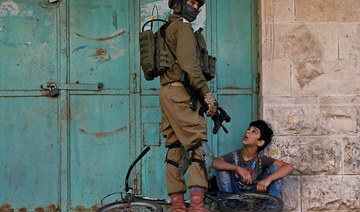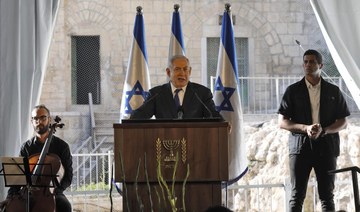AMMAN: Palestinian officials have rejected Israeli efforts to take charge of Hebron’s Ibrahimi Mosque, calling it a violation of existing agreements and UNESCO resolutions.
In 2017, the specialized UN agency declared the city of Hebron and the Ibrahimi Mosque as Palestinian cultural sites and listed them among “world sites that are considered in danger.”
According to the Declaration of Principles (Oslo Accords) of 1993, and the Hebron Accords signed by Benjamin Netanyahu in 1997, the mosque’s management is solely in the hands of the Palestinian municipality.
On Sunday, the Israeli defense minister approved changes in the area without referring back to the Palestinian municipality, which has jurisdiction over it. Israel wants to install an elevator so that people with mobility issues can access the holy site, which has religious significance for Abrahamic faiths.
Hebron Mayor Tayseer Abu Sneneh told Palestinian TV that the Israelis were “playing with fire.”
“They are changing the rules of the game, playing with fire and moving the entire city and area into undesired violent terrain,” he warned.
Abu Sneneh added that the Hebron municipality, established in 1870 during Ottoman rule in the Middle East, was responsible for the city and all its religious and civil institutions.
Ahmad Tibi, an Arab member of the Israeli knesset, described the decision of Defense Minister Naftali Bennett as very dangerous.
“Bennett is one of the pillars of the settler movement, an avid believer in the land of Israeli legend is trying to use his last days as defense minister to cause havoc in the occupied territories so he can boast about it later,” Tibi told Arab News.
The Israeli decision also confiscates further Palestinian land in Hebron.
Hundreds of Jewish settlers live in the heart of the city, protected by 1,500 Israeli soldiers, even as the city’s 200,000 Palestinian Arabs have to navigate around army checkpoints.
“The attempts to Judaize the West Bank and the heart of the city of Hebron and the Jordan Valley are being carried out with the support and encouragement of the US administration,” Ahmad Deek, the political adviser to the Palestinian foreign minister, told Arab News.
He called on the International Criminal Court to “accept the recommendation of the attorney general regarding the applicability of their mandate on the occupied territories and to open an investigation into Israeli war crimes, especially the settlement enterprise.”
An important road in Hebron, Shuhada Street, has been closed off to Palestinians since 1994, when an Israeli soldier entered the mosque and gunned down 29 worshippers who were performing dawn prayers.
An unarmed multinational Temporary International Protection for Hebron (TIPH) force was allowed into the city shortly afterwards, but Israel refused to allow the force access to the mosque. In March 2019, Israel refused to renew their agreement and asked the force to leave Hebron.

























